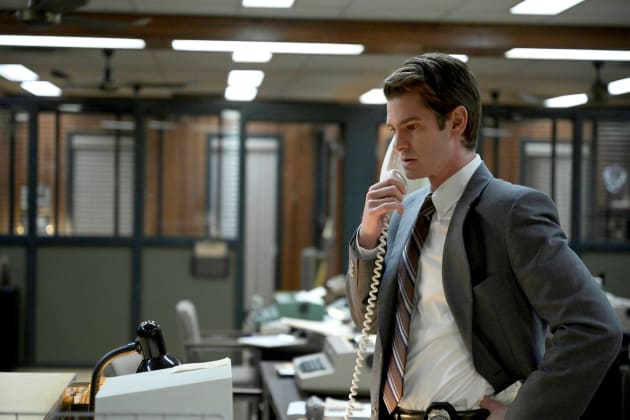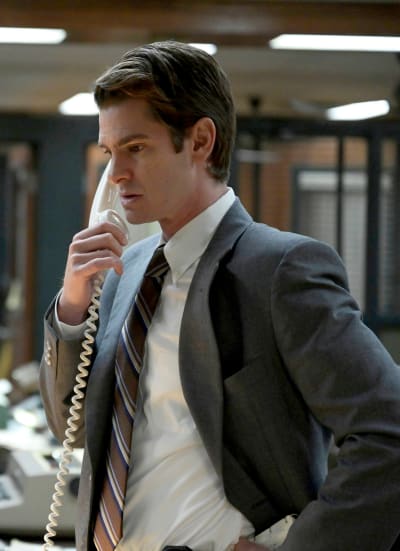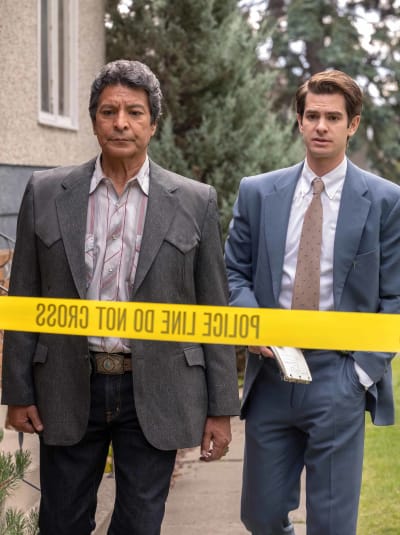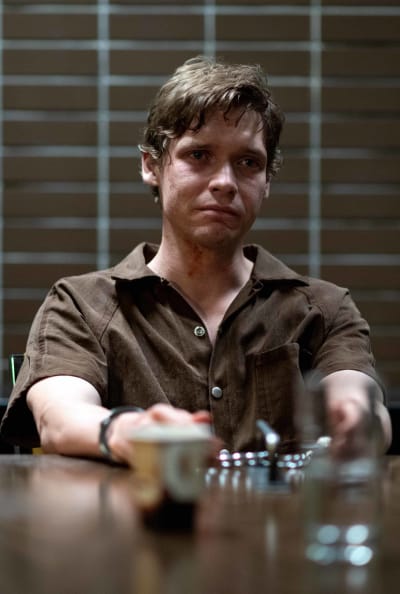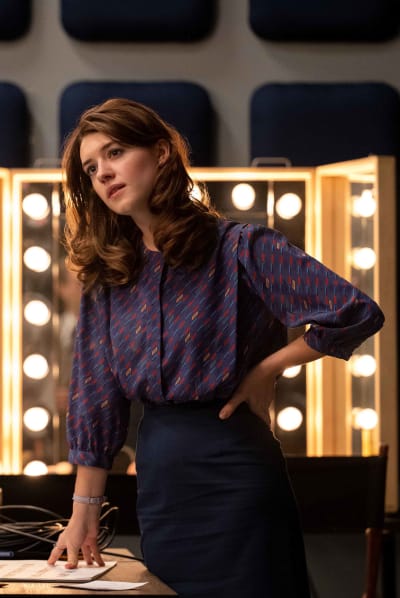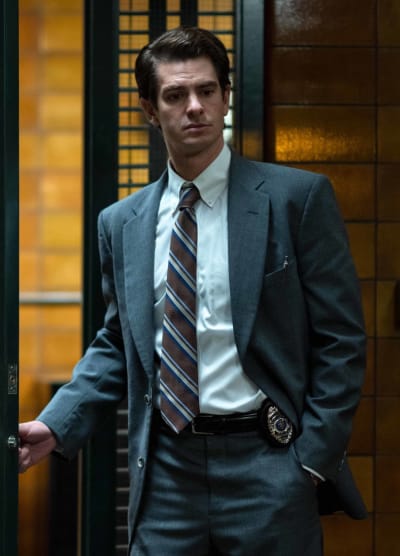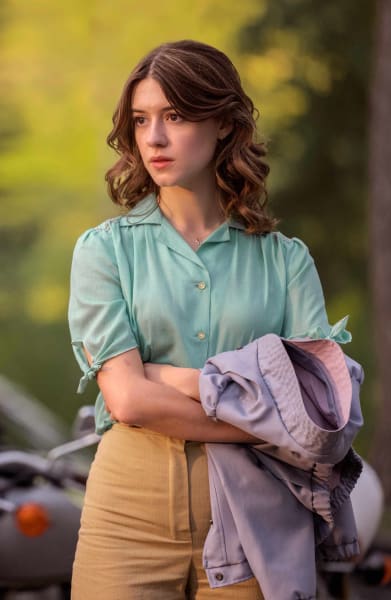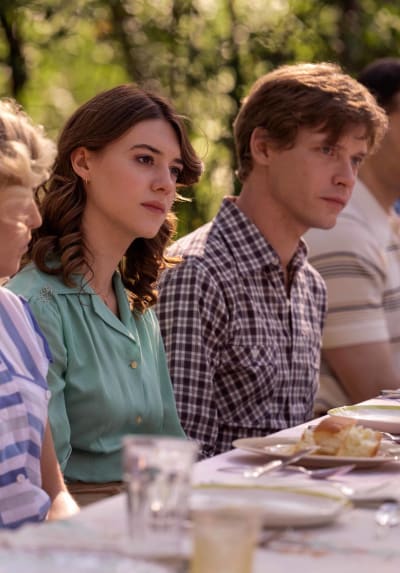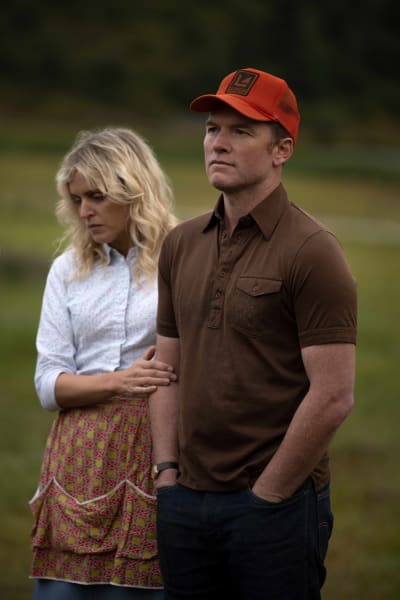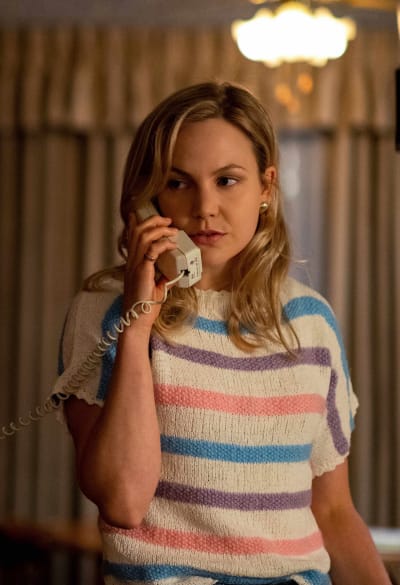Products You May Like
Well-made, if a bit dense, Under The Banner Of Heaven Season 1 Episode 1 bears the beginnings of a solid true-crime drama.
Here, Mormons are on both sides of the law, as Detective Jeb Pyre (Andrew Garfield) must solve a horrific case that brings a prominent LDS family under scrutiny.
There are so many characters and we are bombarded with them in such rapid-fire succession that it can be challenging to keep track of them all at first.
Garfield utilizes his soft-spoken charisma well, and he’s so kind and gentle that it’s often hard to take his Jeb Pyre seriously as a detective. Though he appears to know his stuff, he lets his beliefs get in the way and cloud his judgment.
He’s likable but flawed, and I will say that it is refreshing to see a detective in s prestige crime drama that breaks all the tropes. He’s a caring family man whose drug of choice is faith.
However, his faith is also his weakness. When Allen Lafferty (Billy Howle) proclaims that he is no longer a member of the LDS church, Jeb appears to turn on him.
It’s only later that Jeb realizes he’s going to have to take a step back and understand that just because someone is a Mormon, he shouldn’t immediately believe in their inherent goodness.
Jeb’s a different kind of flawed protagonist. His devotion to the church blinds him to the truth of the community.
Gil Birmingham makes a terrific foil as the older, more experienced Detective Taba.
His interactions with Det. Pyre are a dynamic part of the drama. They clash occasionally, but there is mutual respect and lighter, humorous moments, which are welcome but brief in this dark story.
It’s great having Birmingham central to uncovering the modern-day narrative. He always brings gravitas to a role, and I’m hoping that he gets to take it further (though, given the cliffhanger ending of Under The Banner Of Heaven Season 1 Episode 2, his fate remains shaky and unknown).
Overall, the cast is phenomenal.
Billy Howle is riveting as Allen Lafferty. Hopefully, he becomes a breakout star from this, as his most significant part to date was a brief but pivotal role in Star Wars: Episode IX.
Here, he’s a wreck of a man who may or may not have done some truly reprehensible things, but he’s so believable, with wide expressive eyes and a constant flood of emotion whenever he speaks.
It’s a bold choice to make this character sympathetic, but as the mystery begins to unfold, it’s hard to know what part he had or didn’t have — which, at this point, is precisely how it should be two episodes in.
As the leading lady/murder victim, Brenda, Daisy Edgar-Jones is presented as a tragic, beautiful figure.
No one can seem to help mentioning how pretty and perfect Brenda is, whether it’s her boyfriend/husband, his brothers, her future father-in-law, or her boss. It’s not Brenda’s (or Edgar-Jones’s) fault that she’s beautiful, but it’s a trope that’s getting tired.
Is a murder victim somehow more of a tragedy because she’s pretty? The show seems to be pretty insistent on hammering that home.
It’s not just her beauty that makes her death tragic. Maybe that’s the point the show is trying to make.
We see what Allen sees as he narrates Brenda’s life, her ambition to be a journalist, her yearning to break through the molds LDS women are forced into, and her kindness and gentleness towards children and Jacob. She was more than a pretty face.
Chloe Pirrie brings a nervous, fragile energy to Matilda Lafferty, the Scottish woman who feels as out of place as she sounds (though it’s worth noting that though most of the cast isn’t American, Pirrie’s the only non-American actor speaking with her natural accent).
Matilda’s connection with the Holy Spirit hints at the potential for supernatural involvement, but since the story is so grounded in reality, it is more than likely that it suggests her declining mental health.
There is much animal violence in these first two episodes which can be a lot to take for sensitive viewers. Animal violence often feels like an easy, cheap way to establish that characters are intrinsically evil people.
This is not for the faint of heart, but if you’ve seen the trailer, you probably know if it’s for you or not. The central crime deals with horrific things being done to a baby. Though nothing is shown of Erica in death, even the mention of her fate is intensely distressing.
This is dense, dark material. With so many characters to contend with, it sometimes feels a bit much having the historical aspect of Mormonism included.
The mystery of the bearded mountain men suggests something horrifying and sinister, even if it doesn’t end up being related to the murders of Brenda and baby Erica.
The editing of the show is fluid, and the quick cuts of memory and history from Pyre’s point of view help us get to the chaos in his mind as he descends into the rabbit hole that is the investigation.
Despite its leaps and bounds through time and flashbacks, it is not difficult to follow, which is impressive given its scope.
There are still many unanswered questions by the end of Episode 2.
Where did the Lafferty parents go, and indeed, where have all the Lafferty family disappeared to? That’s a lot of men, women, and children unaccounted for.
Did no one notice until now how long they had been gone? Jeb and his family were at the church with them — if they are such a tight community, why didn’t they notice sooner?
Not having read Jon Krakauer’s nonfiction book of the same name, it’s hard to know how faithful the story is to the original or the actual events. It’s all very intriguing and disturbing. With its gory crimes perpetrated in the name of God, it’s reminiscent of Anthony Campos’s 2020 film The Devil All The Time.
Is this show areligious? Possibly. What is evident is that Dustin Lance Black (showrunner, writer, executive producer) was raised in a Mormon household and has a deep understanding of the history and practice of Mormonism.
Black gives the show a deep sense of authenticity without judgment. Mormons are presented as people, running the gamut of good, neutral, and evil.
The history of Mormonism is plentiful, which is fascinating but hard to connect to if you have no sense of who Joseph Smith or Brigham Young were.
What’s the point of interspersing this history — is it to give weight to the proceedings, to educate the viewers, give it more context, or will it all tie together somehow?
(Having learned all I know about Mormonism from Matt Stone and Trey Parker, it’s somewhat jarring to see it played straight, but that’s a personal problem and not an issue with how it’s presented).
Religion is rife with disturbing stories, with many heinous acts carried out by devout believers.
The first two episodes of Under The Banner Of Heaven lean into the idea that Mormons have been persecuted for their beliefs — which is a valid argument.
But when you look at the evolution of society and how some religious cultures treat their women, there’s a question of whether some beliefs should be tolerated if they infringe on human rights.
Allen rightfully states that he left the church when he had a daughter. It’s sadly often the case that men only realize how bad it is for women when they have a daughter, and sometimes not even then.
You can cherish the women in your life, indeed, and want to take care of them and protect them, but if they are subservient to you and don’t have the same rights as men, is that a community and culture worth protecting?
With a strong cast, intriguing mysteries, and deep roots, Under The Banner Of Heaven shines a light on the dark side of American religion.
Are you intrigued by the mystery of the Laffertys? Will you keep watching?
Share your thoughts in the comments.
Mary Littlejohn is a staff writer for TV Fanatic. Follow her on Twitter.
